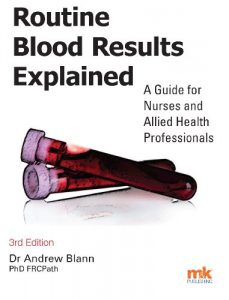Now in its third edition, this essential handbook for nurses and allied health professionals gives clear, simple explanations of blood results, focusing on routinely requested investigations.
There have been many changes since the second edition – from alterations in units (such as g/L for haemoglobin, rather than g/dL) to the merging of haematology with biochemistry, blood transfusion and immunology to form blood science. Accordingly, in this new edition there are more details of immunology, immunological diseases, and the blood tests involved.
These changes reflect the new roles which nurses, podiatrists and physiotherapists are developing, often with increased responsibility for examining, diagnosing and managing patients, and ordering and interpreting blood tests. The objective of this book is to support and enable these professionals to be successful in their new roles.
Wherever possible, each chapter concludes with a brief case study. In addition, more complete case reports – reflecting the different aspects of primary and secondary care – are presented in the concluding chapters.
CONTENTS:
The red blood cell
The white blood cell
Coagulation
Blood transfusion
Immunology
Urea & electrolytes, and renal function
Investigation of liver function and plasma proteins
Atherosclerosis and its risk factors
Calcium, bone and musculo-skeletal disease
Investigation of thyroid function
Blood gases and pH
Case reports in primary and secondary care
Special situations (pregnancy, the neonate, and the elderly)
Physiotherapy and podiatry
Adult reference ranges
There have been many changes since the second edition – from alterations in units (such as g/L for haemoglobin, rather than g/dL) to the merging of haematology with biochemistry, blood transfusion and immunology to form blood science. Accordingly, in this new edition there are more details of immunology, immunological diseases, and the blood tests involved.
These changes reflect the new roles which nurses, podiatrists and physiotherapists are developing, often with increased responsibility for examining, diagnosing and managing patients, and ordering and interpreting blood tests. The objective of this book is to support and enable these professionals to be successful in their new roles.
Wherever possible, each chapter concludes with a brief case study. In addition, more complete case reports – reflecting the different aspects of primary and secondary care – are presented in the concluding chapters.
CONTENTS:
The red blood cell
The white blood cell
Coagulation
Blood transfusion
Immunology
Urea & electrolytes, and renal function
Investigation of liver function and plasma proteins
Atherosclerosis and its risk factors
Calcium, bone and musculo-skeletal disease
Investigation of thyroid function
Blood gases and pH
Case reports in primary and secondary care
Special situations (pregnancy, the neonate, and the elderly)
Physiotherapy and podiatry
Adult reference ranges






